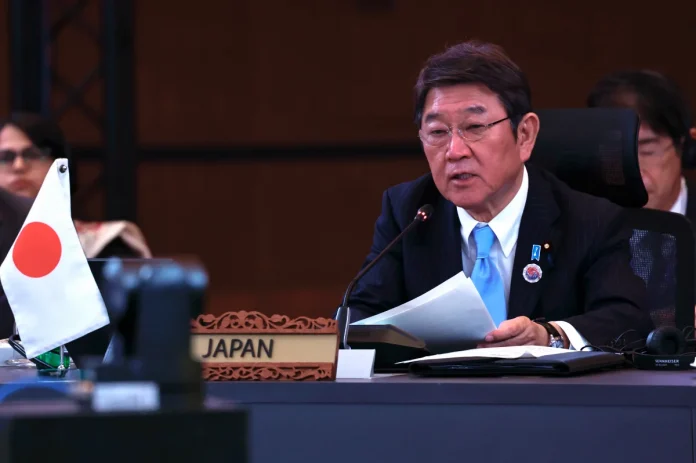Japan strengthens ASEAN cooperation under AOIP framework, focusing on maritime security, carbon neutrality, and energy projects including Malaysian LNG and hydrogen.
KUALA LUMPUR: Japan has reaffirmed its commitment to expanding strategic partnership with ASEAN under the ASEAN Outlook on the Indo-Pacific framework.
Tokyo acknowledged ASEAN’s essential role in maintaining regional peace and stability during the 47th ASEAN Summit and Related Summits.
Press Secretary of Japan’s Foreign Ministry Toshihiro Kitamura said the AOIP vision aligns with Japan’s Free and Open Indo-Pacific initiative.
“Both frameworks share key principles such as openness, inclusiveness, transparency and the rule of law,” Kitamura stated during a press briefing.
ASEAN leaders and Japan’s Prime Minister Sanae Takaichi adopted a joint statement at the 28th ASEAN-Japan Summit on Sunday.
The statement outlines commitment to expand cooperation in addressing global challenges beyond the region.
Both sides will undertake practical cooperation through concrete projects under AOIP’s four priority areas.
These include maritime cooperation, connectivity, UN Sustainable Development Goals 2030, and economic cooperation.
Cooperation will extend to marine plastic pollution prevention and satellite navigation for connectivity.
This marks the second joint statement on AOIP cooperation after the first in 2020.
Japan stands ready to support ASEAN’s various pathways toward carbon neutrality by 2050.
Kitamura noted ASEAN’s rapidly growing and manufacturing-based economies require diverse approaches.
Under the ASEAN+3 framework, Japan committed to practical cooperation including emergency financing.
Food security cooperation, particularly emergency rice reserves, was also reaffirmed.
Deputy Cabinet Secretary Takahito Misumi highlighted advancing economic security cooperation with ASEAN.
He specifically mentioned semiconductor and critical mineral collaboration with Malaysia.
Cooperation on rare earths in Terengganu, Kelantan and Pahang shows promising potential.
Japan currently imports 15.5% of its liquefied natural gas from Malaysia.
Collaboration is expanding in hydrogen and ammonia projects including initiatives in Sarawak.
Studies include ammonia-fired gas power, the ASEAN Power Grid, and carbon capture projects.
These involve partnerships with Petronas and Japanese companies such as Mitsubishi. – Bernama








